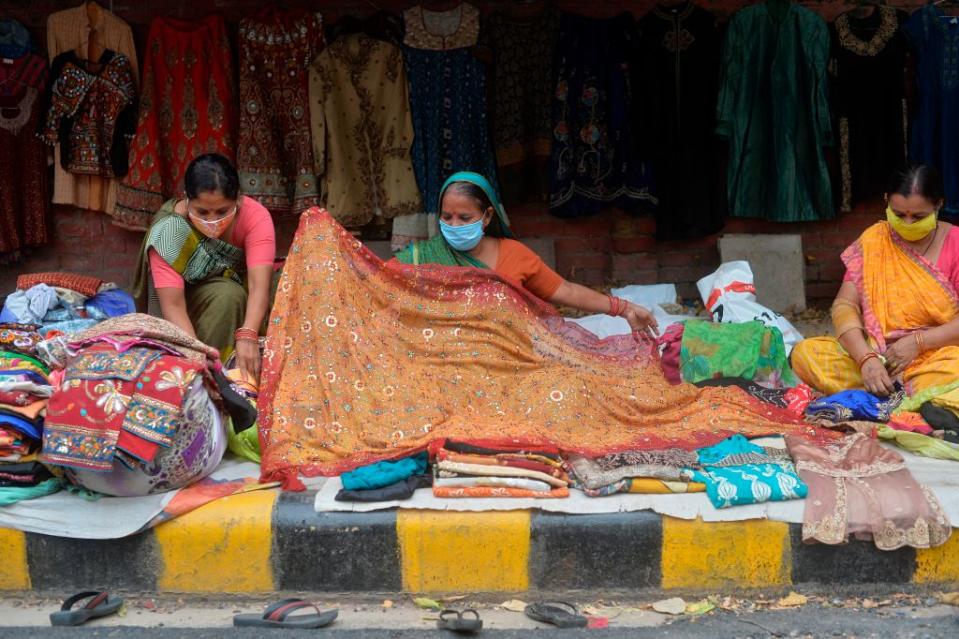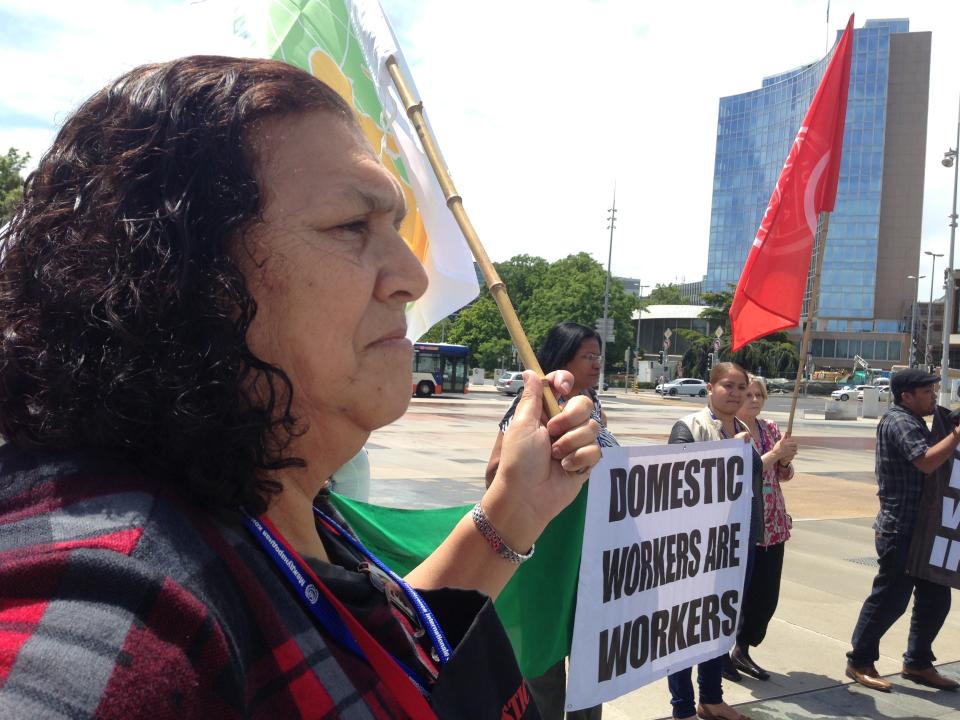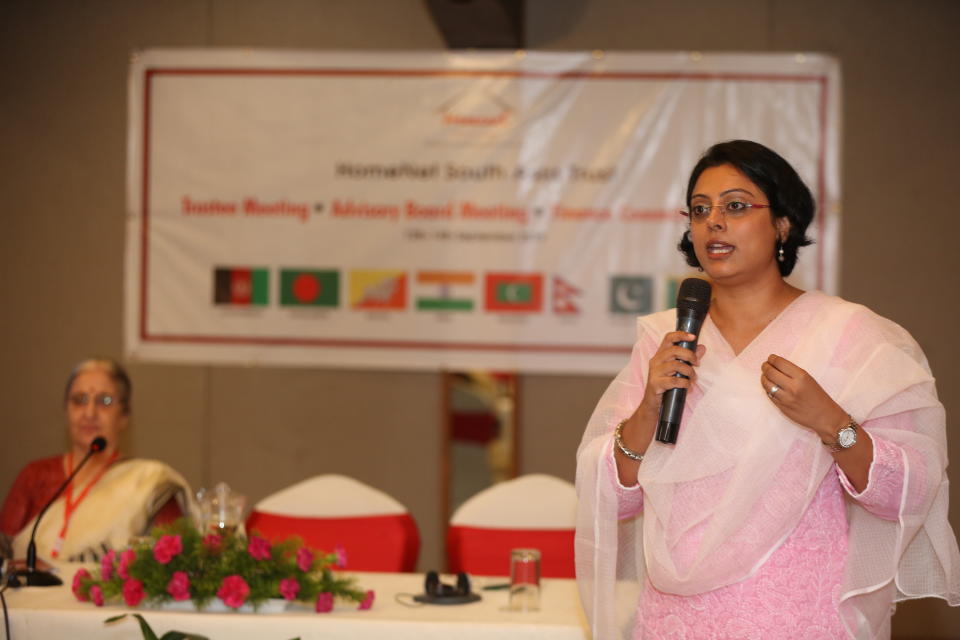Meet the Women Leading the Global Fight for Workers' Rights in the Informal Economy

Women vendors wearing facemasks as a preventive measure against the Covid-19 coronavirus, work at their roadside shop selling sarees, in New Delhi on September 26, 2020. Credit - Sajjad Hussain—AFP/Getty Images
Myrtle Witbooi was just 18-years-old when she convened the first ever meeting of domestic workers in Cape Town, South Africa. It was 1965, during the apartheid years of racial segregation, and Witbooi’s actions carried great risk. “We weren’t supposed to disobey the people we were working for,” Witbooi, now 74, tells TIME in an interview over the phone. “Still today, I can’t tell you how I did it, but I did disobey. I actually fought my way and became a spokesperson for domestic workers”.
Domestic workers make up just one part of a global group of 2.1 billion workers who comprise the so-called informal economy, encompassing countless trades, enterprises and work that is not protected or regulated by the state. Informal workers, from garment makers to street vendors, provide the foundation of the global economy, accounting for more than 60% of the global workforce.
Yet, despite the range in geographies, cultures, and trades that the informal economy spans, one thing unites workers within it—the impacts on women. Globally, 58% of women who work are engaged in informal employment, a figure that rises to 92% in developing countries. In 56% of countries, a larger percentage of women workers than men workers are informally employed.
The pandemic has hit informal workers particularly hard. When many governments responded to the crisis with economic aid, most of these workers were overlooked. According to a study by the International Labour Organization (ILO), twice as many workers in the informal economy fell into poverty during the first month of the pandemic compared to pre-COVID-19 times.
In response, philanthropic organization the Ford Foundation has announced a five-year, $25 million grant to women-led informal worker networks, in an effort to support a global movement calling on governments to invest in protections for informal workers.
“We know there can be no global recovery without informal workers,” Sarita Gupta, director of the Ford Foundation’s Future of Work(ers) program, said in a statement. “This grant recognizes the importance of ensuring billions of informal workers have a seat at the table to have their voices, demands, and needs heard at the national and global level, so policymakers and business leaders recognize their contribution and value.”

Recipients include the International Domestic Workers Federation (IDWF), which represents 600,000 household workers through 84 affiliate organizations, and of which Witbooi is president. Labor-focused scholars have noted that the IDWF is the “first international labor federation run by women for work dominated by women”.
Fighting for workers’ rights in the face of sexism
According to Janhavi Dave, international coordinator at HomeNet International, a global network of home-based worker organizations, there are myriad socio-economic factors that motivate women to enter the informal economy. “The biggest issue is they have a lot of care responsibilities,” she tells TIME. “The second is lack of mobility,” mostly due to restrictions imposed by patriarchal societies. “A lot of women are not allowed to work outside their own homes, but there’s also no safe and affordable transportation for women to move out and work in other spaces.” A lack of formal employment opportunities also forces women into alternative forms of work, she says.
Despite making significant strides—including securing an international convention to protect domestic workers’ rights at the ILO in 2011—the IDWF has not always been taken seriously.
Witbooi says that when she launched the federation without any men involved, the idea was met with skepticism from some men. “I said ‘O.K., fine, let’s leave it there, let us show you what unity is, let us show you the power of women now that we have had enough.’” Now, she says, the IDWF is being recognized for its achievements by former detractors.
During the pandemic, Witbooi says, the IDWF had to rapidly adapt to a world of lockdowns and social restrictions. In the past, the federation’s affiliate organizations distributed brochures and pamphlets to other domestic workers in person, meeting them at bus stops and other local meeting places. Now, they use messaging app Whatsapp. “I was very surprised by the way domestic workers took to their phones,” she says. Witbooi has all the provincial groups she works in on different Whatsapp group chats. Every Monday, she sends inspirational messages to her networks.
The IDWF has a history of working around problems. Under the apartheid regime, Witbooi and other domestic workers would find ways to communicate whenever they could, gathering on “Sheila’s Day,” the South African term for domestic workers’ weekly day off. (”Sheila” was the catch-all name white employers would often give to the black employees whose names they could not pronounce.) “In my street in the afternoon we would take the children for a walk to the park and that is where we started,” Witbooi says.
Read more: The Coronavirus Pandemic’s Outsized Effect on Women’s Mental Health Around the World
Another organization set to benefit from the Ford Foundation’s grant is StreetNet International, a global alliance of organizations representing 735,000 street vendors. There is no definitive count of street vendors in the world, but they are integral to urban economies, particularly in developing countries. In Ghana, for example, street vendors and market traders account for 29% of total urban employment. It is another sector that is a greater source of employment for women than men.
Lorraine Sibanda, a street vendor and trade unionist from Zimbabwe, is president of StreetNet International. Her election in 2016 made her the first Black and first African leader of the global workers’ network.
Sibanda became a street vendor and tradeswoman when her wages as a teacher were insufficient to support her. Confronted with the precarity of the work, where police could confiscate her goods at any minute, she joined trade unions and women’s organizations. “I realized I just enjoyed fighting for my rights as well as the rights of others,” she tells TIME.

It was these organizations that equipped Sibanda with the skills of negotiation and collective bargaining, which she says are just as critical in the informal economy as in more traditional workplaces. “When you look at countries such as Zimbabwe,” she says, “our country is almost totally informal. As street vendors, we are constantly engaging the local authorities and all the necessary stakeholders who our work crosses”. Resources such as StreetNet International’s six-book toolkit support leaders of each of the groups in the network to organize workers and strengthen their collective voice.
The onset of the pandemic demonstrated how integral street vendors are to local economies. “As street vendors, we bring affordable food to their doorsteps,” says Sibanda. “We do the travelling and bring the food.” When these street vendors were absent from their work stations, whole communities were affected.
While the grant funding is a good start, Sibanda hopes that governments’ economic recovery plans include informal workers as the world begins to open up. “We do not need austerity from governments,” she says. “What we need from governments is further protection.”
Unions supporting communities
At the height of the pandemic, it was informal workers’ unions that stepped in when authorities were failing some of the poorest members of society.
Dave of HomeNet International says that home-based workers—who produce goods or services in or near their homes for local, domestic or global markets—were severely affected by restrictions on mobility and disruption to commercial supply chains. Almost two-third of home-based workers—mostly women—are based in Asia and the Pacific region.

Lockdowns and restrictions on movement to prevent the spread of COVID-19 often had a disproportionate impact on those living in poverty. During the lockdown in India, Dave says, people living in Mumbai’s Dharavi—one of the largest slums in Asia—were confined to their cramped living quarters with no access to the shared toilets they typically relied on. Police had cordoned off the slum to ensure nobody stepped outside their homes. “This is when a local workers’ union, LEARN, decided to build human barricades to push back the police,” Dave says. “They said this is absolutely inhumane if we can’t even access toilets.” Union leaders came up with alternative ways to socially distance while accessing facilities, such as food ration stations, and they worked with police to carry out welfare checks on women home-based workers.
HomeNet International observed that, when home-based workers were organised, even if it was a trade union or a cooperative, they had better access to food than those who were not. “Last year,” Dave says, “we actually saw an increase in membership of unions because home-based workers saw the benefits of joining some form of organization.”
Boosted by the Ford Foundation’s grant funding, which will be distributed by non-profit Women in Informal Employment: Globalizing and Organizing (WIEGO), many of the recipients will be heading to the ILO’s annual labor conference later this month. There, the IDWF, HomeNet International, and StreetNet International will lobby for greater forms of social protection, inclusive economic recovery plans, and greater transparency for women workers in the informal economy.
Despite the many challenges ahead, Sibana and Witbooi say they are excited to extend the services and reach of their organizations to those in need.
“For me, working with these women is a reminder of where I’ve been and where I am now,” says Witbooi, who draws on her experience as a domestic worker to inspire the women she works with. “If I can reach from apartheid and free myself from there and today I’m still standing tall, they know they can too,” she says. “They can demand respect and say, ‘I’m a domestic worker, I’m a mother, I’m a wife, and my work should be valued.’”
Correction, Nov. 17
The original version of this story misstated the proportion of women workers in the informal economy. More women than men are informally employed in 56% of countries, but women do not account for the majority of global informal workers overall. The article also misspelled Janhavi Dave’s name.

